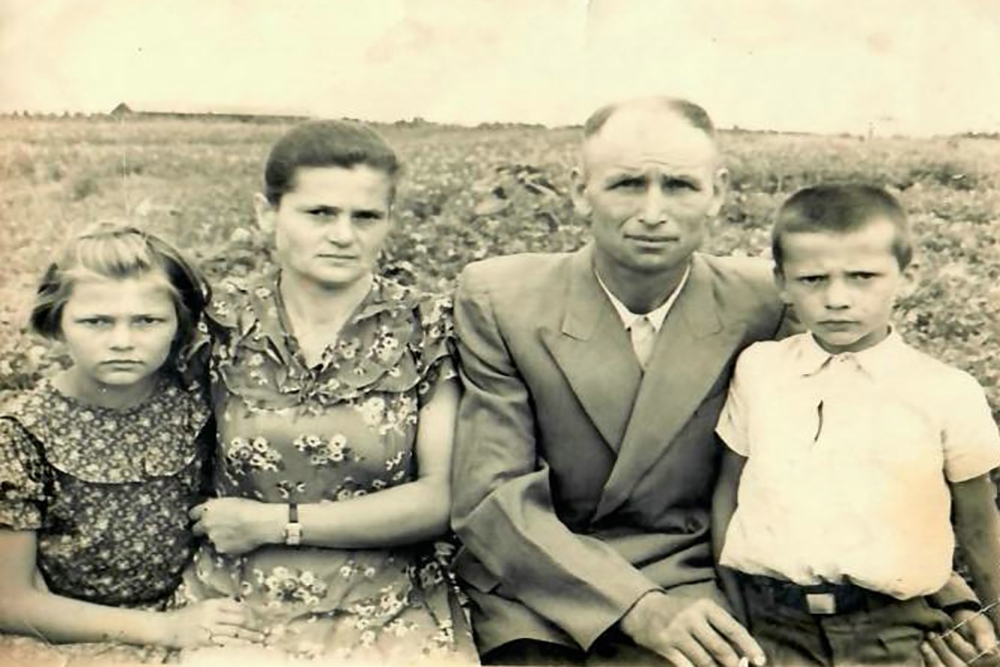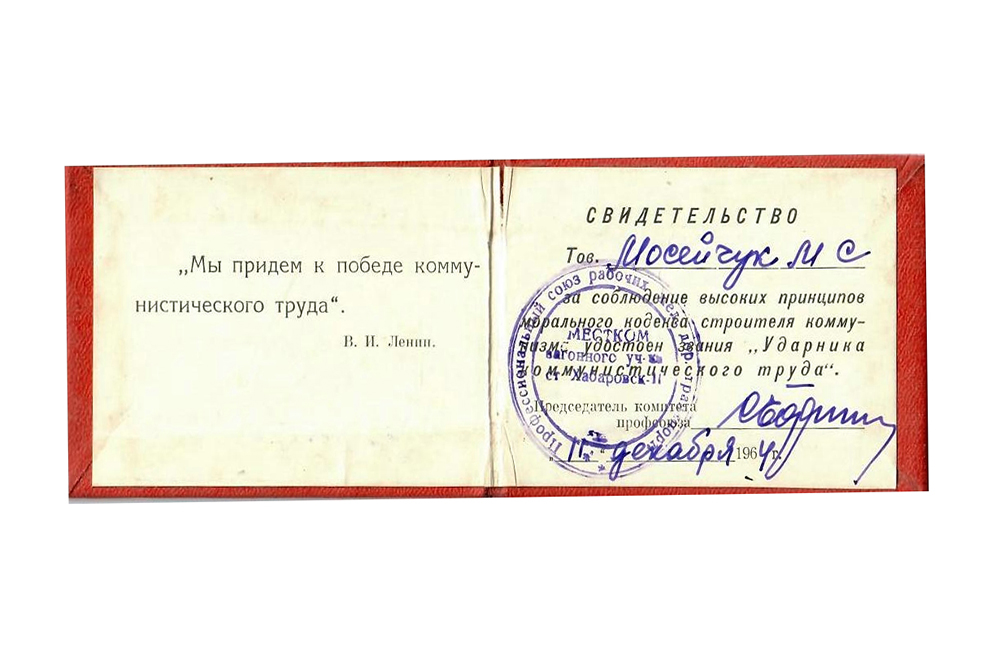Bank of Portraits / Mosiychuk Maria

Mosiychuk Maria, Slobodyuk Sydir and Yustyna
Maria Mosiychuk (Slobodyuk) was born in a peasant family of Sydir and Yustyna Slobodyuk. She had a younger brother, Mykola (b. 1929), and a sister, Raisa (b. 1935).
Nazi troops occupied Mizoch on June 27, 1941. One of the first decrees of the Nazi administration was the "Mandatory Registration of Jews." The next step is to isolate them from the non-Jewish population. In the autumn of 1941, a ghetto was established in the town, where the entire Jewish population of Mizoch and the surrounding villages were expelled. It was located in the center of the settlement, near the modern bus station. The whole area was fenced with barbed wire. An artificial famine was organized in the ghetto. Despite the fact that the German administration banned aid to Jews for fear of death, there were some residents of Mizoch who disregarded their decrees: walking past the ghetto, throwing food over the fence.
On the night of October 13-14, 1942, the Mizoch ghetto was surrounded by police. The Jews were told that they would be taken to work in Germany. To do this, it was necessary to gather in the square at 16 o'clock with valuables. Gathering almost one and a half thousand people, the occupiers led the column in the direction of the railway station. When the Jews realized that they were being executed, they began throwing expensive things off the bridge into the Stubelka River and onto the road. Even then, single shootings began.
According to order of the Germans, the Jews themselves dug a grave pit. Allegedly, for the needs of the Mizoch sugar factory it was necessary to dig a ditch 50 m long, 7 m wide and 6 m deep. It was located at a distance of 300 m from the plant. The massacres here lasted several days.
There was a fire in the ghetto. According to one version, the Jews set fire to the buildings to distract the Nazis and escape. O. Kruglov, a historian and researcher of the history of the Holocaust, cites data that more than 1,500 Jews fell victim to the occupiers in the Mizoch ghetto in October 1942, and about 200 died in a fire.
Among those who managed to escape was a Jewish teenage girl, Sofia Gorshtein, a classmate of Maria Slobodyuk. Her parents, sister and brother were shot by the occupiers, and she miraculously survived. Arriving at the Slobodyuks' house, Sofia begged Maria to persuade her father to hide her from persecution. Sydir and Yustyna understood that they were risking the family's life, but still left the girl with them. They made a hiding place in the attic of the beak, in the hay. They brought her food and water there. At night she came to the house. For almost 11 months Sofia lived in the family of the Slobodyuks. But once there were rumors that they were hiding a Jew. One day a local policeman came into the yard. He said to the owner: " You are hiding a Jew, stay alert ".
Feeling the threat of a search, Sydir took Sofia to the neighbors, but it was a temporary hiding place. The occupiers soon stormed the Slobodyuks' estate and searched the ghetto fugitives. The police offered the youngest six-year-old Raya a candy to confess where the Jew was hiding. But the child, following his father's orders, did not say a word. After the searches, the family was under suspicion. In order not to be exposed to danger in early July 1943, Sydir transported Sofia to relatives in the village of Verkhiv, near Ostroh, where she hid until the expulsion of the Nazis from the region.
July 12, 1943 was tragic for the Slobodyuk family. That day, Sydir Slobodyuk was arrested and executed for aiding Jews (according to the family, they were Polish police officers who collaborated with the Nazis).
"Someone knocked on the door, my father got up and said to my mother: 'I had a dream that my watch fell out of my hand and broke. I bent down and collected the particles. Watch means life. Everything crashed. Yustyna, I will die… ». My father did not run away, he was probably afraid that we would be beaten. I took something on myself, put on my boots, and it was July. Out of fear, I did not know what I was doing. I ran to the crossroads, and then they didn't let me go and they said, "Go home, you'll bring breakfast to the police station tomorrow." I recognized one of them. He came to us during the search. In a word, we haven't seen my father since that time… » From Maria Mosiychuk's memoirs
And in a month new trials were waiting for the family. At the end of August 1943, a large-scale Ukrainian-Polish confrontation took place in Mizoch. Dozens of people on both sides were killed and hundreds of houses burned. The town was on fire for several days. Yustyna and her three children went to a nearby village, where the brother of husband lived. A few weeks later, the family returned, and there were only ashes at the place of their home. Family spent the winter where it was possibly. Yustyna failed to save the youngest daughter Raya. The girl fell ill with pneumonia from hypothermia and soon died. The elder Maria was taken by her aunt Elyzaveta, who lived in Klevan. There the girl graduated from school.

In 1946 Maria Sidorivna married Pavlo Mosiychuk. She gave birth to children Lyubov (born in 1947) and Mykola (born in 1949).
After the establishment of Soviet power, the local population was in no hurry to join the collective farms, some people sabotaged collectivization. All those who opposed the regime were deported. In 1950, the Mosiychuk family was recognized as wealthy peasants and deported to the Far East.
"We were evicted like wealthy peasants (kulaks). People from the KGB, the police and the precinct came at night. They wrote that we have 8 hectares of land, a horse, a cow and a threshing machine. They took everything. They said that "in the name of Soviet power, we are evicting you." Two small children, a weak man (suffering from pulmonary tuberculosis), mother-in-law in despair. I wrapped the children, put some food in the bag. We were brought to the transfer point in Klevan. We spent there a month. And then in freight trains we were taken to the Khabarovsk Territory. And to this day I don't know why… »From Maria Mosiychuk's memoirs
The deportees were housed in barracks. The children, exhausted by the difficult conditions of moving, were sick all the time. The man could not work due to his health condition. Maria had to support her family alone. The woman got a job on a farm as a calf. Due to difficult living conditions and hard work Maria got health problems (frostbite of the extremities and constant pneumonia). Later, she and her husband managed to get a job in a car depot. In 1957, Maria (with the assistance of the head of the depot) was allowed to visit relatives in Mizoch for the first time.
The Mosiychuk family was finally able to return to Ukraine in 1974. In court, they had to return their house, which after eviction became the property of a local collective farm, and was later sold to other people. The litigation lasted several years (documents are stored in the stock collection).
After returning to Mizoch, Maria reconnected with Sofia Gorshtein, who lived in Kremenets, Ternopil region, before her moving to Israel in 1978.
In 1992, at the invitation of the Yad Vashem Holocaust Memorial, Maria visited Jerusalem, where she took part in the ceremony on the occasion of awarding her parents Sydir and Yustyna (posthumously) and her title of Righteous Among the Nations.
Svitlana Demchenko
Kyiv
National museum of the History of Ukraine in the Second World War
-
fingerprintArtefacts
-
theatersVideo
-
subjectLibrary








